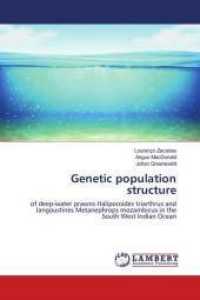- ホーム
- > 洋書
- > ドイツ書
- > Humanities, Arts & Music
- > Music
- > history of music
Description
(Text)
(Short description)
Theatre scholars and musicologists from Russia, Poland, Hungary, Romania, the Czech Republic, Austria and Germany came together in spring 2017 at the Center for Popular Culture and Music for a symposium, where they discussed for the first time the topic "Popular Music Theatre under Socialism: Operettas and Musicals in the Eastern European States 1945 to 1990". This involved general questions such as: Did the uniform (prescribed) worldview lead to identical plays, or are there - in spite of a transnational ideology - national specific differences? And what did these differences possibly look like? The authors of this volume describe the phases of development, the national productions went through, and what influence the import of plays from abroad had on it, whether from the "fraternal socialist countries" or the "capitalistic West".
(Text)
Theatre scholars and musicologists from Russia, Poland, Hungary, Romania, the Czech Republic, Austria and Germany came together in spring 2017 at the Center for Popular Culture and Music for a symposium, where they discussed for the first time the topic "Popular Music Theatre under Socialism: Operettas and Musicals in the Eastern European States 1945 to 1990". This involved general questions such as: Did the uniform (prescribed) worldview lead to identical plays, or are there - in spite of a transnational ideology - national specific differences? And what did these differences possibly look like? The authors of this volume describe the phases of development, the national productions went through, and what influence the import of plays from abroad had on it, whether from the "fraternal socialist countries" or the "capitalistic West". They examine the government guidelines for authors and composers over the decades. Who were the most important authors and composers? Was there any "socialist operetta", any "socialist musical"? And what political, social and ideological topics were negotiated on stage?
The volume demonstrates the importance of a topic that has so far received little attention in research on European theatre and music history.
(Review)
"Dieses Buch versammelt spannende Analysen, Geschichten, Daten und Fakten. Allein der Anmerkungsapparat vieler Artikel ist ein wertvoller Fundus. [...] Lesenswert. Martin Bruny, In: musicals 8.21, S. 77




![Geschichte der Abderiten : Gedichte / Nachrichten / Anzeigen / Rezensionen. Februar 1781 - Januar 1782 [290 - 308] (Wielands Werke)](../images/goods/ar/work/imgdatak/31103/3110339994.jpg)


